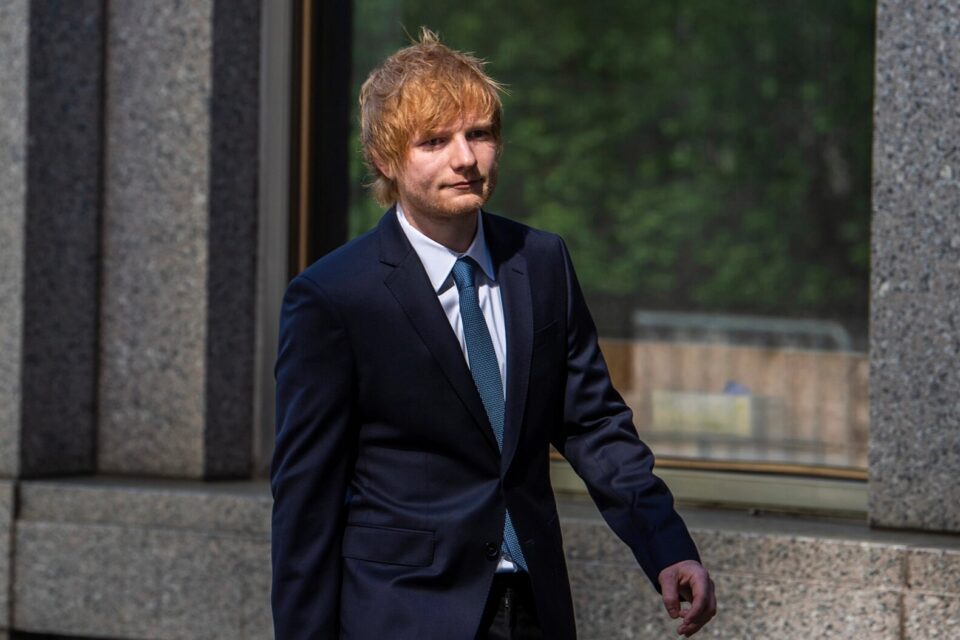Ed Sheeran Takes the Stand in Marvin Gaye Copyright Trial
“If I’d done what you’re accusing me of doing, I’d be an idiot to stand on stage in front of 20,000 people [and do that],” said the Musician on Tuesday

Ed Sheeran walks into Manhattan federal court on Tuesday, April 25, 2023, in New York. AP PHOTO/BRITTAINY NEWMAN
Ed Sheeran took the stand on Tuesday in a New York courtroom, denying accusations that his hit song “Thinking Out Loud,” copied Marvin Gaye’s soul classic “Let’s Get It On.”
A lawyer defending the estate of a co-writer of Gaye’s 1973 song said he had “smoking gun” evidence that Ed Sheeran took elements of the Seventies classic on his 2014 single during his opening statement in the civil trial against the musician.
Attorney Ben Crump made the remarks during the court hearing where the British star’s attorneys claimed the musician wrote the track “without copying.”
The plaintiff’s team presented concert footage where Sheeran merged the two songs during a show; earlier in the day, Crump described the mashup as a “confession,” according to the Associated Press.
“If I’d done what you’re accusing me of doing, I’d be an idiot to stand on stage in front of 20,000 people [and do that],” Sheeran said Tuesday in response to the allegations. “It is my belief that most pop songs are built on building blocks that have been freely available for 100s of years.”
Sheeran’s lawyer Irene Farkas told the court that the musician and Amy Wadge wrote the “heartfelt song” on their own “without copying” Gaye. Farkas explained that the elements in Sheeran’s song are frequently used and were not implemented by Gaye first.
The new opening statements from Crump come six years after the heirs of Ed Townsend — who co-wrote the 1973 song with Gaye — filed a lawsuit against Sheeran, alleging that it had “striking similarities” that violate the copyright.
“The Defendants copied the ‘heart’ of ‘Let’s’ and repeated it continuously throughout ‘Thinking,’” according to the 2016 lawsuit. “The melodic, harmonic, and rhythmic compositions of ‘Thinking’ are substantially and/or strikingly similar to the drum composition of ‘Let’s.’” (In 2019, the Townsend estate’s lawsuit was ultimately postponed by the judge because he wanted to wait for the resolution of a similar case against Led Zeppelin’s “Stairway to Heaven.”)
Late last year in an attempt to have the lawsuit dismissed, Sheeran’s lawyers argued that the song elements in question were too common to be protected by copyright and that the lawsuit was “baseless,” the BBC reported.
“There is no bright-line rule that the combination of two unprotectable elements is insufficiently numerous to constitute an original work,” Judge Louis Stanton wrote in his decision. “A work may be copyrightable even though it is entirely a compilation of unprotectable elements.”
During the trial, the jury will continue listening to recordings of the tracks, focusing on the melody, harmony, and rhythm of the track, as opposed to the song’s lyrics. (It will focus on the sheet music that was submitted to the U.S. Patent and Trademark Office.)
While the Gaye family is not involved in the “Thinking Out Loud” lawsuits against Sheeran, the precedent set in a different case involving Gaye’s music and “Blurred Lines” looms over all new copyright infringement claims. Notably, the court took into account not just sheet music but studio arrangement too and ruled that “Blurred Lines” significantly aped the vibe of “Got to Give It Up,” something that had previously been beyond copyright protection. A jury awarded Gaye’s heirs $7.4 million at trial; it was later trimmed to $5.3 million by the judge.
Sheeran, who earlier this year won a plagiarism lawsuit in the U.K. over his hit “Shape of You,” last settled a lawsuit over another one of his hits, “Photograph,” for $20 million in 2017.
“I feel like claims like this are way too common now and have become a culture where a claim is made with the idea that a settlement will be cheaper than taking it to court, even if there is no basis for the claim,” Sheeran said in a video posted on Twitter in 2017. “It’s really damaging to the songwriting industry.”
From Rolling Stone US.







